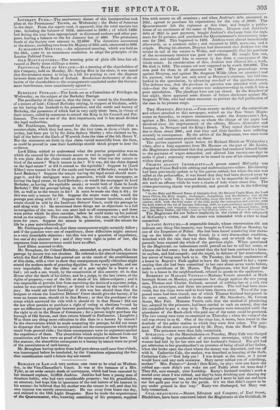BERKELEY PEERAGE.—The Lords sat as a Committee of Privileges on
Wednesday, on the subject of the Berkeley Peerage.
The peculiarity of this case is, that the claim is vested in the fiiundation of a tenure of land ; Colonel Berkeley relying, in support of his claim, solely on his having the freehold in his possession, and the castle and barony of Berkeley, the possessors of which had in very early times been, in virtue of their tenure, called by summons to attend the King in his Council and Par- liament. The case is one of the first importance, and it has much divided the legal authorities.
Mr. Fonblanque, leading counsel for the claimant, mentioned that a counter-claim, which they had seen, for the first time, at three o'clock yes- terday, had been put in by Sir John Sydney Shelley ; who claimed ou be- half of the heirs of the Earls of Warwick from the time of the 5th Henry V. But the statement set forth in that claim varied materially from the facts, as could be proved in case their Lordships should think proper to hear the evidence.
Lord Eldon wished to understand what the precise proposition was on which the counsel for the claimants meant to rest in support of the claim.
It was plain that the claim rested on tenure, but what was the nature or kind of the tenure ? Was it tenure in fee ? If it was, did the claim depend on the legal estate ? or did it extend to the equitable ? Suppose he (Lord Eldon) were tenant in fee of the castle and barony of Berkeley, would he be Lord Berkeley ? Suppose the tenant having the legal estate should mort- gage it, and the mortgagee were in possession, would the mortgagee, as having the legal estate, be Lord Berkeley ; or would the mortgager be Lord Berkeley, as having the equitable estate ; or would both of them be Lords Berkeley ? Did the peerage belong to the tenant in tail, or the tenant for life, as well as to the tenant in fee ? It must be made out that it did ; for this was only a tenure for life. Suppose the estate were sold, would the peerage pass along with it ? Suppose the tenant became insolvent, and the estate should be sold by the Insolvent Debtors' Court, could the peerage be sold along with it ? He mentioned these things not as objections to a full investigation of the sase, but one must look to all consequences ' - and these were points which he must consider, before he could make up his judicial mind on the subject. The estate for life, too, in this case, was subject to a term for years. Suppose the termor in possession, would the tenant for life he a peer notwithstanding ?
Mr. Fonblanque observed, that these consequences might certainly follow ; and if the question were one of expediency, these difficulties might amount to a very formidable objection : but this was not a question of expediency, but one of dry abstract law ; and if they were right in point of law, the argument from inconvenience could have no effect.
Lord Eldon assented to this.
Mr. Brougham, for Colonel Berkeley, contended, at great length, that the peerage by tenure was not obsolete. He referred to the absurd consequences which the Earl of Eldon had pointed out as the result of the establishment of this claim, with a view to show that consequences equally ridiculous might attend the modern mode of granting dignities. It was very possible, and not very improbable, that the eldest son of a peer might be a knave or a fool ; yet such a son would, by the constitution of this country, sit in that House after the death of his father, and be a judge, in the last resort, of the rights of property,—nay of the life or death of his fellow-subjects ; and it was impossible to prevent him from exercising the duties of a supreme judge, unless he was convicted of felony, or found to be insane by the verdict of a jury. He would ask their Lordships if this was less absurd than that the assignee to whom the Insolvent Debtors' Court should give the barony, if he were an honest man, should sit in that House ; or that the purchaser of the estate which conveyed the title with it should sit in that House ? Did not the law allow persons to purchase a right of voting at elections ?—and he saw no difference in principle between purchasing the right of election, and the right to sit in the House of Commons ; for a person might purchase the borough of Old Sarum, and then return himself to Parliament. (Laughter.) Was there any thing more ridiculous in this than in a barony by tenure ? In the observations which he made respecting the peerage, he did not mean to disparage that body ; he merely pointed out the consequences which might result from general rules ; but these consequences were no argument against the expediency of them. The absurdities which might be deduced from our constitution and laws were no proof of the nonexistence of these laws. In like manner, the absurdities consequent to a barony by tenure were no proof of the nonexistence of such barony. Mr. Brougham having spoken from half-past eleven until near four o'clock, was interrupted before he concluded, by the Committee adjourning the fur. ther consideration until a future day not named.


















 Previous page
Previous page